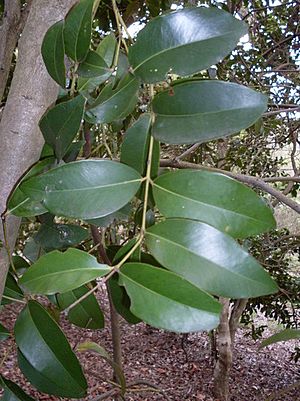Acmena hemilampra facts for kids
Quick facts for kids Broad-leaved lilly pilly |
|
|---|---|
 |
|
| Acmena hemilampra - leaves | |
| Scientific classification |
|
| Kingdom: | Plantae |
| Clade: | Tracheophytes |
| Clade: | Angiosperms |
| Clade: | Eudicots |
| Clade: | Rosids |
| Order: | Myrtales |
| Family: | Myrtaceae |
| Genus: | Acmena |
| Species: |
A. hemilampra
|
| Binomial name | |
| Acmena hemilampra |
|
| Script error: The function "autoWithCaption" does not exist. | |
| Synonyms | |
|
|
Script error: No such module "Check for conflicting parameters".
The Broad-leaved lilly pilly, known scientifically as Acmena hemilampra, is a type of tree found in the rainforests of New South Wales and Queensland, Australia. You can often spot it growing near the sea on sandy beaches. It also thrives further inland, especially by streams. This tree grows best in rich, red-brown volcanic soils, like those found around the Mount Warning caldera (an old volcano crater). Its natural home stretches from Yamba all the way up to the Cape York Peninsula in Australia's far north-east.
Contents
Discovering the Broad-leaved Lilly Pilly Tree
The Broad-leaved lilly pilly is a medium to large tree. It can grow up to 35 metres (about 115 feet) tall. Its trunk can become quite wide, reaching 120 centimetres (about 4 feet) across.
Trunk and Bark Features
On older, larger trees, the trunk often has wide, flat parts at the base. These are called flanges or buttresses. The bark on younger trees is fairly smooth. As the tree gets older, its bark becomes more cracked and flaky. It has a reddish-brown colour.
Leaves: What Makes Them Special
The leaves of the Broad-leaved lilly pilly grow in pairs opposite each other on the stem. They do not have jagged edges. Each leaf is usually 4 to 9 centimetres (about 1.5 to 3.5 inches) long. They are quite thick and wide. The tip of the leaf is blunt, not sharp. This is different from the Lilly Pilly tree, which has a drip tip (a long, narrow point). The underside of the leaf looks dull and sometimes has a whitish-blue coating, called glaucous. You can see the leaf veins more clearly on the top surface. There are only a few oil dots on the leaves.
Flowers and Fruit
Cream-coloured flowers grow in clusters called panicles. These flowers appear from October to January. After the flowers, white, round berries start to form. These berries usually grow in large bunches. You can see them from May to August.
Growing New Lilly Pilly Trees
If you want to grow new Broad-leaved lilly pilly trees from seeds, it's a good idea to remove the fleshy part of the berry first. This helps the seeds sprout. Germination (when the seed starts to grow) can be slow. It might take up to 80 days for a seed to sprout. However, if you take cuttings (small pieces of the plant), they tend to grow roots well.
Images for kids
 | Laphonza Butler |
 | Daisy Bates |
 | Elizabeth Piper Ensley |


